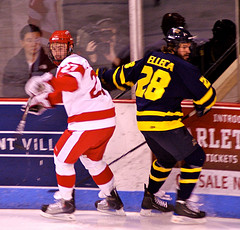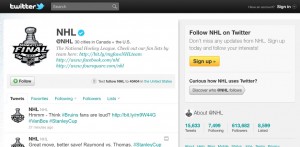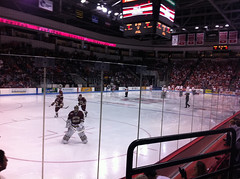
Vinny Saponari in a March 2010 game against Merrimack College. Photo: Flickr user seriouslysilly (Some Rights Reserved)
The story of the day amongst BU hockey fans was the reported Boston College transfer application rejection by dismissed Terrier forward Vinny Saponari. The rumor had been lurking amongst those close to Boston area college hockey for a few weeks, and the story broke for good when US Hockey Report (aka, USHR, a subscription site that reports on junior, youth and college hockey) posted a piece this morning quoting Saponari’s USHL head coach.
Saponari’s current coach with the USHL Dubuque Fighting Saints, Jim Montgomery, is the only interview in USHR’s brief report, which then spurred on reports by the Eagle Tribune’s Mike McMahon, BostonSportsU18 and the Daily Free Press’s Boston Hockey Blog. The Boston Hockey Blog tried to get a quote with Saponari, but “a call and text were not returned.” Word had spread outside of the USHR report – two individuals mentioned to me that area coaches had just started being open about the news last evening, and the news spread like wild fire through the expanding, but still very small, world of hockey.
As the news was circulating on Twitter, a few folks asked within social media, “Well, who are we all to be talking about a pretty embarrassing and private matter for this hockey player? Why is Saponari’s rejection news?”
There is no question to me that this is news – Saponari’s initial dismissal from BU was very public, as the Terrier program had to give reason for his absence in the then upcoming season, and he decided to engage on interviews on the subject. His decision to subsequently transfer to BC, BU’s biggest hockey rival, was made public on his own Facebook page and a few media sources.
So Saponari’s rejection by BC was going to become public whether he liked it or not. For better or worse, his own statements on the matter earlier this fall made us all expect to see him on the Conte Forum ice come next September. Because of the level of expectation already prepared, the college hockey watching public would find out about the rejection eventually. In hindsight, Saponari, his family and his “family advisors” should have kept word of his desire to transfer down Comm Ave quiet until all the i’s were dotted, t’s were crossed, and transcripts approved.
But where the critics of the publicity of Saponari’s denial may have a legitimate point is that the only on-the-record source through this entire story has been the player’s own USHL coach. Was it really appropriate for Montgomery to be so forthcoming with this news with USHR in the first place? Was it his place to do so? Was he representing the family, and if so, should he or the USHR author been more explicit in saying so?
On a much larger level, if a coach is part educator, part advisor, part mentor, and part counselor, shouldn’t he uphold a certain level of confidentiality?
I’m not defending Saponari in any way (if I don’t have anything nice to say, I’m not going to say anything at all), but didn’t he deserve a tad more from Montgomery? Should USHR have looked for a quote from Saponari or his family? If Montgomery was acting on their behalf, shouldn’t that have been more explicit?
What do you think?
 I attended Monday’s Realtime conference in New York City, at which the NHL’s Director of Social Media Marketing and Strategy Michael DiLorenzo gave a case study on how the NHL approaches social media. Of course, it was easily the most entertaining moment of the day for mega sports fan me, but that aside, it was also an amazing presentation with a ton of information.
I attended Monday’s Realtime conference in New York City, at which the NHL’s Director of Social Media Marketing and Strategy Michael DiLorenzo gave a case study on how the NHL approaches social media. Of course, it was easily the most entertaining moment of the day for mega sports fan me, but that aside, it was also an amazing presentation with a ton of information.
